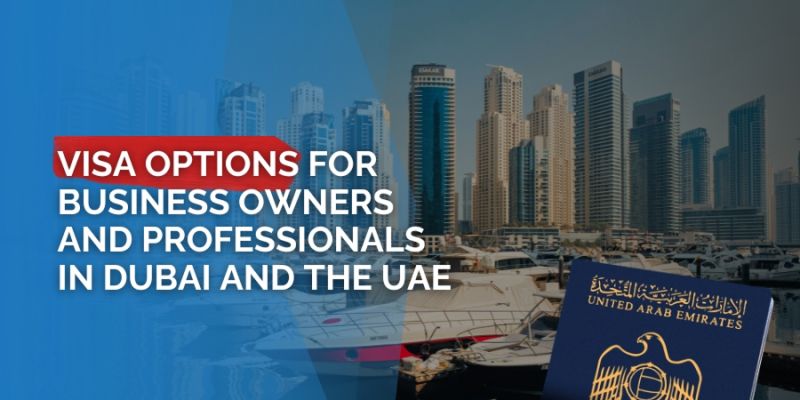When people search for the types of visa in the UAE, they’re usually not just browsing — they’re planning a move. The UAE has built a reputation as one of the easiest places in the world to get established as an entrepreneur, remote worker, or skilled professional. Whether you want to launch a startup in Dubai, run a consultancy from Abu Dhabi, or simply secure a long-term base in the Gulf, there’s a visa designed for you.
The challenge isn’t getting a visa — it’s picking the right one from the menu. This guide breaks down the most important options, how to apply for them, and what they cost, so you can match your plans to the right path and avoid costly mistakes.
Why Are UAE Business Visas So Popular?
Business visas in the UAE have become a global draw for one simple reason: they open the door to a tax-friendly, internationally connected business hub. With the right visa, you can live legally in the country, run your business, and build a future in one of the most dynamic economies in the world.
The benefits go well beyond just “being allowed to stay.” A residence visa tied to business or professional activity gives you the right to open a local bank account, sign long-term leases, and access government portals that make running a company easier. It also lets you sponsor your family — spouse, children, and in some cases parents — so they can join you.
One benefit is that the UAE has no personal income tax and only taxes business earnings above AED 375,000 (9% as of 2023). With a world-class airport network, political stability, and UAE residency status, it’s no wonder European, Asian, and international companies choose to establish themselves here.
What Are the Main Types of Business Visas in Dubai and the UAE?
If you want to live and run a business in the UAE, there’s not just one visa — there’s a menu. The most important ones are: Golden Visa, Green Visa, Remote Work (Virtual) Visa, Retirement Visa, and Blue Visa. Each has distinct eligibility criteria, duration, and scope.
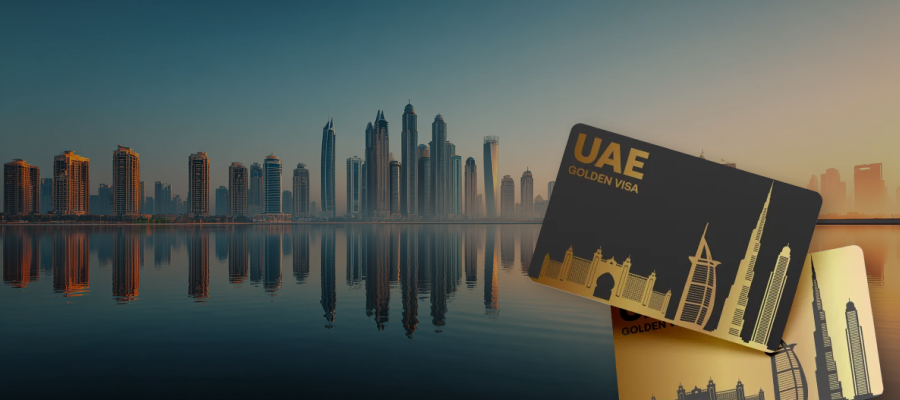
Golden Visa
A local sponsor is not necessary for the 5- or 10-year renewable Golden Visa, which is a long-term residency visa.
Key benefits:
- You can stay outside the UAE beyond the usual six-month limit and still keep your status.
- You can sponsor family members, including your spouse and children of any age, as well as domestic helpers.
- Offers strong credibility with banks and business partners.
Investors in Public InvestmentsIf you invest through a UAE-accredited fund, you may qualify for a 10-year Golden Visa without a sponsor. The conditions include:
- A letter from an accredited investment fund confirming a deposit of AED 2,000,000, or
- A valid commercial or industrial license and a memorandum of association proving capital of at least AED 2,000,000, and
- A letter from the Federal Tax Authority confirming annual tax payments of at least AED 250,000.
Additional requirements:
- You must fully own the invested capital — loans don’t count.
- You must provide valid medical insurance for yourself and your family.
Investors in CompaniesEntrepreneurs who invest directly in UAE companies can also qualify. This category, nominated by the Dubai Future Foundation, covers several paths:
- Running a pilot project with a registered annual income of at least AED 500,000 (≈1 million dirhams) through the Ministry of Economy or local authorities.
- Receiving approval from an incubator or the Ministry of Economy for a project expected to generate at least AED 2 million in revenue.
- Being the founder of a pioneering project that has been sold for at least AED 7 million dirhams.
Property Investors (Dubai thresholds)Property ownership remains one of the most common routes:
- An investment of AED 750,000 in Dubai real estate qualifies for a 2-year residence visa.
- Ownership of property worth AED 2,000,000 or more qualifies for the 10-year Golden Visa.
Skilled professionals and talent categoriesThe Golden Visa also covers professionals in medicine, science, IT, and other high-demand fields, provided they hold a qualifying job offer and salary.
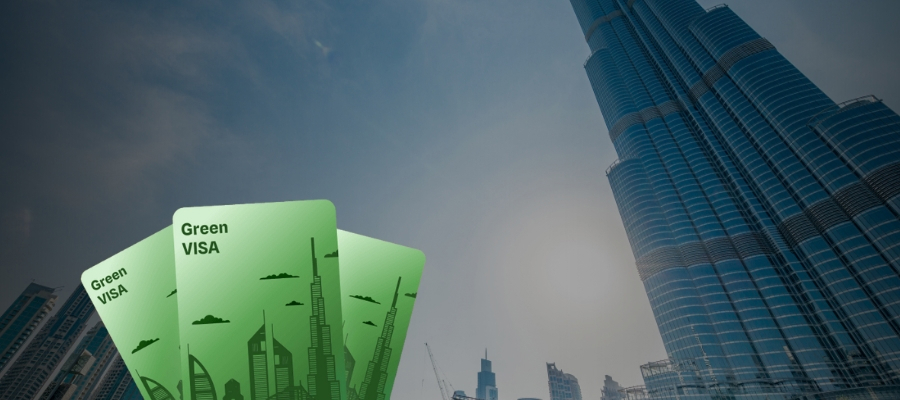
Green Visa
The Green Visa is a 5-year self-sponsored residence visa for freelancers, skilled professionals, and investors.
- No need for a local sponsor or employer.
- Lets you work with multiple clients or switch jobs more easily.
- Renewable if you continue to meet eligibility requirements.
People who aren't ready for the Golden Visa but still want more security than a normal 2-year visa could choose this.
- Freelancers and Self-Employed PeopleApplicants must provide:
- A freelance or self-employment permit issued by the Ministry of Human Resources and Emiratisation (MoHRE).
- Proof of a bachelor’s degree or a specialised diploma.
- Evidence of self-employment income of at least AED 360,000 over the past two years, or proof of financial solvency for the duration of stay in the UAE.
- Skilled EmployeesTo qualify, applicants must:
- Hold a valid employment contract.
- Be classified in occupational levels 1, 2, or 3 under MoHRE’s official system (these include managerial, professional, and technical roles).
- Hold at least a bachelor’s degree or equivalent.
- Earn a minimum monthly salary of AED 15,000.
Remote Work (Virtual) Visa
The Remote Work Visa lets you live in the UAE while working for a company abroad.
- Valid for 1 year and renewable.
- Needs a legal work permit or proof of owning a business abroad, along with health insurance and a monthly income of at least $5,000 USD.
- No local sponsor is required.
Perfect for digital nomads or remote professionals who want to make Dubai or another emirate their base.
Retirement Visa
The UAE offers a 5-year renewable Retirement Visa for people aged 55 and above, or with at least 15 years of work experience, who meet one of these conditions:
- Own property worth AED 1,000,000 or more.
- Hold AED 1,000,000 in savings or investments.
- Have a monthly income of at least AED 20,000.
Blue Visa
The Blue Visa is a 10-year residency option for people contributing to sustainability, climate science, and environmental work.
- Focused on professionals and researchers in green sectors.
- Recognizes contributions to the UAE’s climate and environmental goals.
How Can You Apply for a Business Visa in Dubai or the UAE?
Short answer: pick the visa that matches what you do (Golden, Green, Remote Work, Retirement, or Blue), file the application through the right authority (ICP nationwide or GDRFA in Dubai, often via a free zone/typing center), then complete medicals, Emirates ID biometrics, and residence issuance. No guesswork—just follow the steps in order.
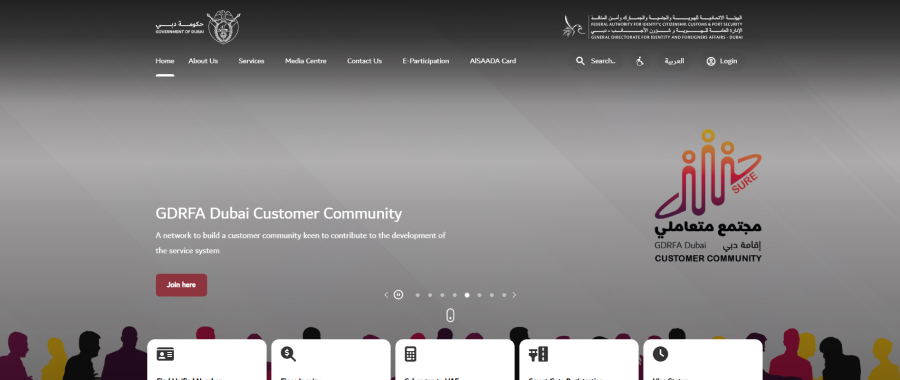
Step-by-step
- Choose the right visa pathDecide whether you qualify as an investor/partner, Golden/Green applicant, freelancer, remote worker, entrepreneur, or retiree. If you’re company-based, make sure your trade license and establishment card are active (free zone or mainland). If you’re going Golden/Green, check the category requirements first.
- Prepare your documentsCommon items:
- Passport (6+ months validity) and a clear photo
- For company routes: trade license, establishment card, MOA/share certificate, office lease (or flexi-desk)
- For family sponsorship (if you’ll add dependents): attested marriage/birth certificates
- Health insurance (mandatory in Dubai/Abu Dhabi; increasingly required elsewhere)
- For remote work: proof of employment or business abroad and qualifying incomeKeep PDFs handy; most submissions are online.
- Apply for the entry permit (if you’re outside the UAE)File through ICP (most emirates) or GDRFA (Dubai) directly, via an Amer/typing center, or through your free zone’s PRO. Most residence entry permits are valid ~60 days to enter and complete the next steps.
- Status change (if you’re already inside the UAE)Instead of exiting/re-entering, you can do an in-country status change through the same portals/centers, so the residence process continues without travel.
- Medical fitness test (ages 18+)Book an approved clinic for a blood test and chest X-ray. Certain roles require extra screening or vaccinations. You’ll receive the fitness result electronically.
- Emirates ID biometricsAfter medical clearance, complete fingerprints and a photo at an ICP service center (or a fast-track provider if available). Your Emirates ID validity will match your residence duration.
- Residence issuance (the modern “visa stamping”)The UAE no longer relies on a physical visa sticker in your passport. Once approved, your residence permit is issued electronically, and your Emirates ID becomes your proof of residency. You’ll get an e-residence/approval you can download for travel and KYC.
- Add dependents (optional)When your own residence is active, apply for spouse/children (and, in some cases, parents). You typically have up to 60 days from their entry permit to finish their medicals, biometrics, and residence issuance.
- Final checks
- Activate/renew health insurance in the emirate where you live (mandatory in Dubai and Abu Dhabi).
- Keep your trade license (and establishment card) current if your visa is company-based.
- Save digital copies of all approvals for bank account opening, tenancy, utilities, and future renewals.
That’s the whole arc: pick → file → enter/status change → medicals → biometrics → residence issued. Follow that order and you’ll avoid the classic time-wasting loops.

Want to learn more about UAE business setup services?
What Is the Cost of Business Visas in Dubai and the UAE?
If you’re budgeting for a UAE visa, think of it as a package: government fees, medical checks, Emirates ID, and health insurance all come together to make the final bill. Go for a 10-year Golden Visa, and the number rises, but you renew far less often.
What Drives the Price
1. Type and Length of VisaGolden Visas are the most expensive upfront, with government fees in the AED 2,800–3,800 range per applicant, plus the cost of your property purchase or investment if you qualify that way.Green Visas (5-year) tend to run around AED 2,000–3,000 once you add entry permit, medical, Emirates ID, and issuance.Remote Work Visas are lighter on the wallet, usually just over AED 1,000 in government fees plus insurance and medical tests.
2. Emirate or Free ZoneCosts shift a little depending on where you register. Dubai and Abu Dhabi can be slightly higher than the northern emirates, and each free zone has its own bundled packages that mix license, office, and visa into one fee.
3. Medical Test and Emirates IDMedical fitness tests usually cost AED 300–700, with the higher end for fast-track service. Emirates ID is priced by how long it’s valid — roughly AED 170 for a single year, climbing with each extra year.
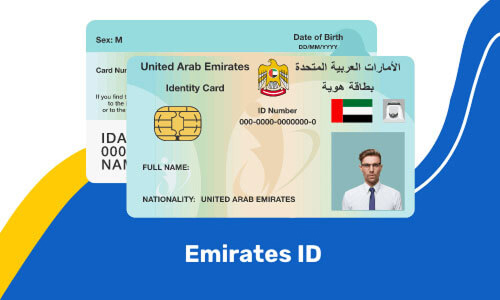
4. Health InsuranceIn Dubai and Abu Dhabi, you need to have protection before your visa is approved. Plans for individuals are reasonably priced (AED 800 to 1,500 per year), but plans that cover families or provide benefits in other countries may cost more.
5. Consultant or PRO SupportIf you don’t want to deal with portals and paperwork yourself, most setup firms charge an extra AED 1,000–3,000 to handle submissions, follow-ups, and status changes. For many business owners, that fee pays for itself in saved time and fewer mistakes.
Why Planning Matters
You can avoid shocks if you plan your travel budget well. For regular visas, these fees will be charged again and again every time the visa is renewed. People with a Golden Visa, on the other hand, only have to update their visas every ten years. This makes the higher starting cost easier to explain over time.
Can You Switch Between Different Visa Types in Dubai and the UAE?
Yes, you can — but it’s not as simple as clicking a button. When your situation changes, the UAE lets you move from one visa type to another, though you’ll have to cancel the old visa and start a fresh application. That means repeating the basics: medical test, Emirates ID, and paying the new government fees.
When People Usually Switch
- From employment to Green Visa: Professionals who want to work with multiple clients or switch jobs more freely often choose the Green Visa as a way to sponsor themselves.
- Between free zone and mainland: Moving from one jurisdiction to another means closing or transferring your license first, then applying for a new visa under the new setup.
Things to Watch Out For
Switching visas resets the clock on your residence, so do it near the end of your current visa to avoid wasting months you’ve already paid for. If you have family on your sponsorship, you’ll also need to renew their visas so they match your new status. And because each switch is treated like a new application, plan for medicals, status change fees, and Emirates ID all over again.
How to Choose the Right UAE Business Visa for Your Activities
Don’t pick a visa because it sounds fancy — pick one that matches how you plan to live and work here. Your budget, your business model, and how long you see yourself staying should drive the choice.
- Golden Visa: Best if you already have a home worth at least AED 2 million or if you meet the government's requirements for professionals or investors. It's been stable for 10 years with no regular updates.
- Green Visa: Gives you self-sponsorship for five years, good for consultants and independent professionals who want to work with more than one client.
- Remote Work Visa: You can live in Abu Dhabi or Dubai and work or run a business in another country. All you have to do is show that you have a steady way to make money.
- Retirement Visa: If you’re 55+ with enough property, savings, or income, this gives you a way to stay long-term.
- Blue Visa: Sustainability and climate experts will be able to stay for 10 years if they help the UAE's green economy.
Can Family Members Be Sponsored Under Dubai and UAE Business Visas?
Yes — most long-term UAE residence visas (Golden, Green, Remote Work, Retirement, and Blue) let you bring your immediate family, but there are rules you need to follow. The good news is that once your visa is stamped, you can usually apply for dependents without much delay.
Here’s what you can normally sponsor:
- Spouse: Allowed under almost every business visa type as long as you can show a valid marriage certificate (attested if issued outside the UAE).
- Children: Sons are generally covered until age 25, daughters until marriage. Some visas let you renew for older dependent children if they’re in school.
- Parents: Possible, but you usually need to meet a minimum income threshold (around AED 20,000 per month in Dubai) and rent a larger apartment that meets the space requirement.
How the Process Works
Once your own visa and Emirates ID are issued, you submit applications for each dependent, attach their passport copies, photos, and attested documents, and pay the government fees. Medical tests are required for adults (spouse and parents).
Things to Watch
- Your family’s visas are always linked to yours — if your visa is canceled or expires, theirs do too.
- Health insurance is mandatory for each dependent in Dubai and Abu Dhabi, so budget for that upfront.
- If you switch visa types (for example, from Green to Golden Visa), you’ll need to renew your family’s visas under your new status.
Sponsoring family is usually straightforward if your paperwork is clean, and most business owners handle it through a PRO or consultant to save time.

Conclusion
Visas in the UAE aren’t just paperwork — they set the tone for how you run your life and business here. Pick the wrong one and you’ll waste money reapplying, chase renewals, and risk gaps in your residency. Pick the right one and you’ll have room to breathe, plan ahead, and actually focus on growing your company.
Many expats start with a Green or Remote Work Visa and only upgrade when they’re sure the UAE is where they want to stay. If you’ve already invested or built a business, the Golden Visa is worth aiming for because it removes most of the renewal hassle. Once the visa is sorted, you can finally spend your time on what you came here to do: winning clients, hiring talent, and building a future here.
Yes — you can only work in the activity listed on your trade license. If you want to do more, you’ll need to add activities or amend the license.
Yes. You can choose Dubai, Abu Dhabi, or the northern emirates — just make sure your license, office lease, and visa are all issued under the same emirate.
It already is. Once your visa is stamped and you get your Emirates ID, you’re officially a resident.
No. You just need to enter the UAE once every six months to keep your residency from lapsing.
